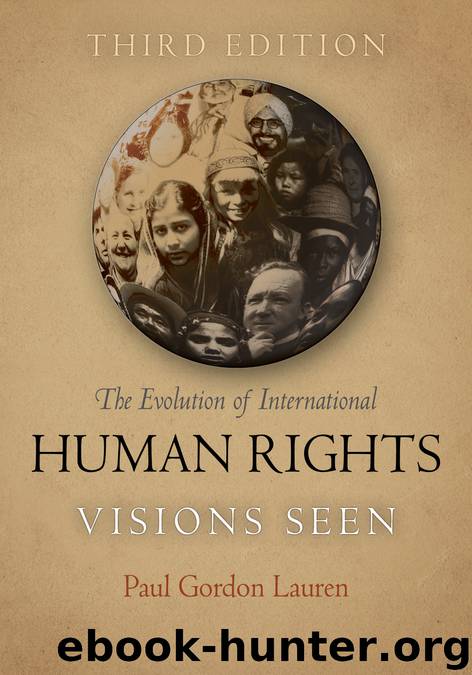The Evolution of International Human Rights by Lauren Paul Gordon;

Author:Lauren, Paul Gordon;
Language: eng
Format: epub
Publisher: University of Pennsylvania Press
Published: 2011-04-05T04:00:00+00:00
Challenging Questions of Philosophy
It is likely that no issues of public policy in the world raise more difficult philosophical questions than those of human rights. Nevertheless, up to this stage in the evolution of international human rights, diplomats had only been on the margins of serious philosophical discourse. In their more private moments they may have pondered philosophy and ethics, but as representatives of nation-states they rarely ventured beyond immediate political interests. They never before had been required to provide any precise definition or articulation of the meaning of “human rights” or “fundamental freedoms,” to wrestle with moral diversity on a global scale, nor to thoughtfully consider what the extension of rights might mean for the world as a whole. Instead, visions of rights largely had come from religious visionaries, philosophers, or men and women with a sense of responsibility toward victims of abuse and determined to act on principles very different from that of national sovereignty. This changed dramatically once the United Nations decided that its Commission on Human Rights, composed of government representatives, should draft an international bill of rights capable of securing universal acceptance. Such a formidable task suddenly presented a whole array of inescapable and challenging questions of philosophy.
Those who understood something about the nature of international human rights clearly anticipated that these philosophical issues would arise with force and with drama. Thus, when the commission first met in January 1947, observers packed the visitors’ seats to capacity in order to witness what they knew would be a fascinating discussion. Even more telling, governments appointed not political flunkies but a remarkable collection of individuals of unusual quality and stature who they believed would be thoughtful, articulate, and intellectually capable of understanding the complicated questions that would confront them. Several held Ph.D. degrees. China named Dr. Peng-chun Chang (Zhang Pengjun), a career diplomat and former professor with a powerful intellect, highly knowledgeable about the West, Islam, and Arabic culture, yet deeply committed to Confucianism and the values inherent in Asian culture and philosophy. Lebanon appointed Dr. Charles Habib Malik, a former professor of philosophy and a brilliant scholar, born into a family of Greek Orthodox Arabs, raised at a crossroads of many cultures, and personally and professionally shaped by both Christianity and Islam. France designated Dr. René Cassin, a widely published professor of international law and skilled legislative draftsman who had been raised by a devout Orthodox Jewish mother and an intensely antireligious father, represented his country at the League of Nations, served as a long-standing member of the Ligue Française des Droits de l’Homme, lost many of his own relatives to the Holocaust, and would later become president of the European Court of Human Rights. The Philippines selected the dynamic Carlos Romulo, an experienced public official, a devoted Catholic, a brigadier general, and recipient of a Pulitzer Prize for journalism. Charles Dukes, a trade unionist and former Member of Parliament with extensive service, represented Britain. Hansa Mehta, a Hindu and determined advocate for human rights, especially those of women, who had been arrested for civil disobedience, came from India.
Download
This site does not store any files on its server. We only index and link to content provided by other sites. Please contact the content providers to delete copyright contents if any and email us, we'll remove relevant links or contents immediately.
| Anthropology | Archaeology |
| Philosophy | Politics & Government |
| Social Sciences | Sociology |
| Women's Studies |
The Secret History by Donna Tartt(18230)
The Social Justice Warrior Handbook by Lisa De Pasquale(11963)
Thirteen Reasons Why by Jay Asher(8472)
This Is How You Lose Her by Junot Diaz(6463)
Weapons of Math Destruction by Cathy O'Neil(5854)
Zero to One by Peter Thiel(5507)
Beartown by Fredrik Backman(5372)
The Myth of the Strong Leader by Archie Brown(5249)
The Fire Next Time by James Baldwin(5033)
How Democracies Die by Steven Levitsky & Daniel Ziblatt(4971)
Promise Me, Dad by Joe Biden(4916)
Stone's Rules by Roger Stone(4875)
100 Deadly Skills by Clint Emerson(4700)
A Higher Loyalty: Truth, Lies, and Leadership by James Comey(4566)
Rise and Kill First by Ronen Bergman(4554)
Secrecy World by Jake Bernstein(4407)
The David Icke Guide to the Global Conspiracy (and how to end it) by David Icke(4397)
The Farm by Tom Rob Smith(4332)
The Doomsday Machine by Daniel Ellsberg(4253)
